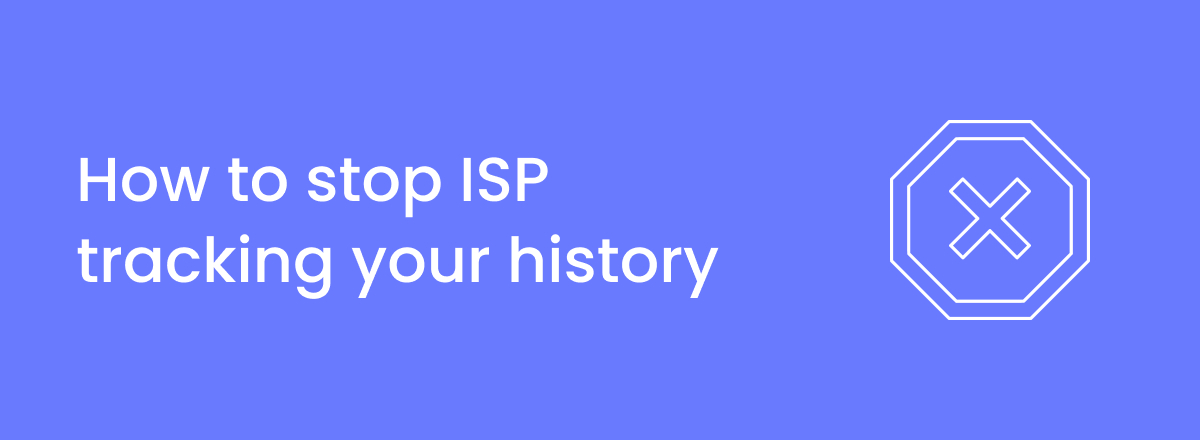You may think your browsing history is safe, but your Internet Service Provider (ISP) can track everything you do online using the IP address they assign to you. Your unencrypted emails, downloads, passwords, locations are all visible to your ISP.
Fortunately, you can use a VPN to prevent your ISP from tracking you. A VPN hides your IP address and encrypts all your data, making it nearly impossible for anyone to monitor you. A VPN will also unblock geo-restricted content and help you circumvent ISP throttling.
In this article, we’ll explain why your ISP tracks you, what you can do to stop them, and whether or not they can detect if you’re using a VPN.
 How to stop ISP tracking with a VPN
How to stop ISP tracking with a VPN
- Pick a reliable VPN. We recommend NordVPN.
- Download and install your preferred VPN.
- Find a server close to you to get the best speeds.
- Connect to the server and start surfing the web anonymously.
Why is ISP tracking you?
The “official” reason your ISP tracks you is so they can improve your online experience, but there are other reasons why they do it. Here are some of them:
They’re required by law
Governments in some countries have stringent laws regarding online consumer data and ISPs have no choice but to comply with them. For example, in 5-Eyes, 9-Eyes, and 14-Eyes regions, ISPs are bound by law to collect online data.
It’s still unclear how much data the 5/9/14 Eyes regions can actually collect since much of their activities are confidential, but it’s safe to say that ISPs retain things like browsing history, email content, passwords, and social media activities.
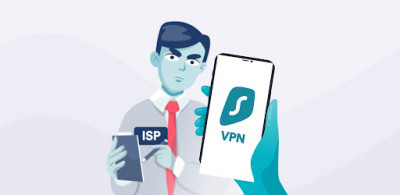
They sell your data to advertisers
Your data is in demand and marketers are willing to pay decent money for it. Many ISPs sell your data to marketers to make profit, which is why you see so many ads about things you search for on Google or talk about with friends on Facebook.
In many countries, it’s actually legal for ISPs to sell your data to advertisers.
They have to comply with government censorship
In many countries, there are certain sites and apps that are illegal to use. In China, for example, Google services don’t work. In many countries, it’s illegal to access gambling and torrenting sites. ISPs keep an eye on Internet users to make sure they don’t try to circumvent these government restrictions.
Without ISPs spying on you, it would be difficult for a country to implement these restrictions.
They throttle your connection
ISPs throttle your connection for various reasons. Sometimes they do it during peak hours to distribute bandwidth equally across the entire network, but most of the time, it’s because they know you’ve been visiting restricted sites or you’ve exceeded your bandwidth limit.
ISPs throttle your connection so you would upgrade to a better plan. Without monitoring your data, they won’t be able to know if you’re staying away from restricted sites.
How to prevent an ISP from seeing your online activity
Here’s how you can prevent your ISP from seeing your online activity:
Use a VPN
Using a VPN is one of the best ways to stop your ISP from spying on you. A VPN, or a virtual private network, is a tool that hides your IP address and encrypts your data. It makes it look as if your traffic is coming from a different region, which prevents your ISP from knowing what sites you’ve been visiting.
With a VPN, your data will be hidden from your ISP and they won’t have any reason to throttle your connection. It’ll also hide all your email content, social media activities, and passwords. Even if your ISP manages to get their hands on them, it’ll appear as gibberish to them. NordVPN is a good premium VPN that has advanced security features.
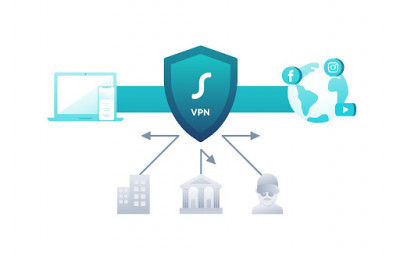
Use Tor
The Tor browser, also known as the Onion Router browser, will pass your Internet traffic through multiple layers of encryption to keep your data safe from your ISP and other parties. It connects to random servers before taking you to the website you want to visit, so it appears as if you’re located in the server the Tor browser last connected to.
It won’t be as fast as a VPN, but you’ll get extra protection. You can also access the dark web using Tor and other restricted sites without worrying about your ISP finding out and throttling your connection.
Use Onion over VPN
Combine the powers and features of the Tor network and a VPN to boost your anonymity and keep your ISP from snooping. To use Onion over VPN, you first have to connect to a VPN and then use the Tor browser. This way, your online activities are protected by the VPN while also going through the multiple layers of encryption that the Tor browser provides.
Since you’re using two methods of protection, your Internet speed will suffer a little, but Onion over VPN is one of the most effective ways to block ISP tracking. We recommend NordVPN to use with Tor as it has a built-in Onion over VPN connectivity feature.

Use HTTPS sites
HTTPS sites encrypt data between you and the website, which prevents your ISP from tracking your online activities. To know if a website is HTTPS, look for a padlock icon next to the website in the URL bar.
HTTP websites aren’t safe as they’re not encrypted and anyone, including your ISP and hackers, can see personal information like passwords and credit card numbers. There are extensions available online that will turn every HTTP site you visit into HTTPS. Keep in mind, though, that using HTTPS websites is only a good practice, and it’s nowhere near as effective as using a VPN or Tor.
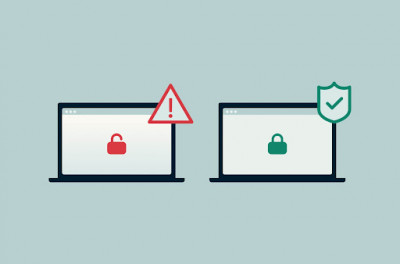
What data do ISPs track?
ISPs track pretty much everything you do online and they don’t just monitor your data, they also store it so they can sell it to advertisers or government agencies. It’s usually mentioned in the terms and conditions of your contract what data your ISP tracks, but generally these are the things they keep an eye on:
- Your browsing history. Even your incognito traffic can be tracked by your ISP.
- All your unencrypted email content.
- Unencrypted passwords and other sensitive information like your credit card details on HTTP websites.
- Duration of your online activities, I.e, how long you stay on a single website.
- Your online shopping activities and history.
- Your browsing habits.
- Your downloads, including things you download from torrenting sites.
- Your geographic location.
- Your cryptocurrency transactions.
- Unencrypted social media activities, including data such as who you talk to, and images and texts you share.
- Source and destination IP addresses.
- Voice messages.
- Any content that you stream.
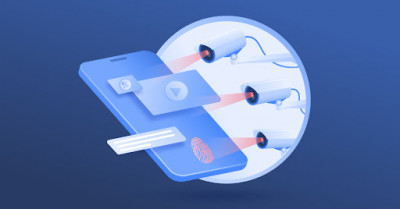
These are all things your ISP will be able to track if you frequent HTTP sites, but even if you only use HTTPS sites, ISPs will still be able to see what sites you visit and how much time you spend on them.
Can ISP detect I am using a VPN?
Yes, your ISP can detect that you’re using a VPN. They can’t see your real IP address or your data, but they can see that you’re browsing the web from an unfamiliar IP address. They can also use a method called “Deep Packet Inspection (DPI)” to try and understand the movement of your data. They won’t know what it is exactly you’re using to hide your data, but if they find out it’s a VPN, they can block it.
Your ISP still won’t be able to see your browsing history, though, and blocking a VPN isn’t always possible. It’s difficult if you’re using the OpenVPN protocol which uses different ports instead of only one. Even if they manage to block your VPN, you can easily change the protocol and start using it again.
Most free VPNs won’t encrypt your data and it’ll be very easy for your ISP to know you’re using one, which is why we recommend that you use a premium VPN like NordVPN.
The bottom line
Most ISPs will find ways to track you even if you use a VPN because it helps them make money. Finding a good ISP is perhaps more important these days than worrying about being tracked even while using a VPN.
We’ve found that it’s best to use a VPN on a device on which you regularly have to deal with sensitive information, even if you know your ISP isn’t tracking you. If you’re a casual user, then you don’t need to have a VPN activated all the time.
We’re moving towards a more privacy-focused Internet, but as things are right now, it’s crucial to use a VPN to hide your data and keep your ISP from snooping. VPN’s data encryption feature will make sure your data is unreadable even if it’s leaked in a data breach.
It’s not just your ISP you have to worry about, but also hackers and government agencies who can steal your data and spy on you if you’re not using a VPN. The bottom line is that you should use a VPN as often as you can to keep your data safe.
Frequently asked questions
Yes, VPNs do prevent ISP tracking. With a VPN, your data will be encrypted and your IP address will be masked. Your ISP will be able to see that you’re browsing from a different IP address, but they won’t be able to see anything you do online.
We recommend NordVPN to stop your ISP from tracking you. NordVPN has top-notch security features like kill switch protection, built-in Onion over VPN connectivity, and DNS leak protection. We’ve personally tested NordVPN and found it to be very effective against keeping your data safe. You can get it for $11.99/month.
No, your ISP can’t see what you’re Googling because all Google searches are encrypted. When a site is encrypted, the only thing your ISP can see is the domain name. Everything after the first “/” is hidden from them. You can read more about how Google keeps your data safe here.


